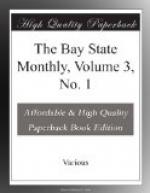The marriage of widows made special laws needful. Property was held in the name of the husband. The wife owned nothing, though it came from the meagre dowry of her own father. When the husband died the widow had certain rights as long as she “remained his widow.” These rights were small at best, though the estate may have been accumulated through years of their mutual toil and hardships. We have notes of a number of cases, but give only a few. We omit the names of the contracting parties. “T—— C—— of A—— and H—— B—— of S——, widow were married together, September y’e 28th, 1748, before O—— B—— J.P. And at ye same time y’e s’d H—— solemnly declared as in y’e presence of Almighty God & before many witnesses, that she was in no way in possession of her former husband’s estate of whatever kind soever neither possession or reversion.” An excellent Deacon married an elderly matron, Dorothea ——, and before the Justice of Peace “Y’e s’d Dorothea declared she was free from using any of her former husband’s estate, and so y’e s’d Nathaniel [the Deacon] received her.” The following declarations are not without interest. “Y’e s’d John B—— declared before marriage that he took y’e s’d Hannah naked and had clothed her & that he took her then in his own clothes separate from any interest of her former husbands.” Again a groom declares: “And he takes her as naked and destitute, not having nor in no ways holding any part of her former husband’s estate whatever.” We have also the declaration of a widower on marrying a widow in 1702, who had property in her own name, probably gained by will, “that he did renounce meddling with her estate.” These declarations evidence that the widow relinquished, and that the groom received her without the least design upon the estate. It has been intimated that in a few instances these declarations became a “sign,” but we can hardly credit it. The “rich” widow was taken out of the matrimonial problem.
The following affidavit is spread on the town records of Amesbury:
“Whereas Thomas Challis of Amesbury in y’e County of Essex in y’e Province of y’e Massachsetts Bay in New England, and Sarah Weed, daughter of George Weed in y’e same Town, County and Province, have declared their intention of taking each other in marriage before several public meetings of y’e people called Quakers in Hampton and Amesbury, and according to y’t good order used amongst them whose proceeding therein after a deliberate consideration thereof with regard to y’e righteous law of God and example of his people recorded in y’e holy Scriptures of truth in that case, and by enquiry they appeared clear of all others relating to marriage and having consent of parties and relations concerned were approved by said meeting.
Now these certify whom it may concern y’t for y’e full accomplishment of their intention, this twenty-second day of September being y’e year according to our account 1727, then




